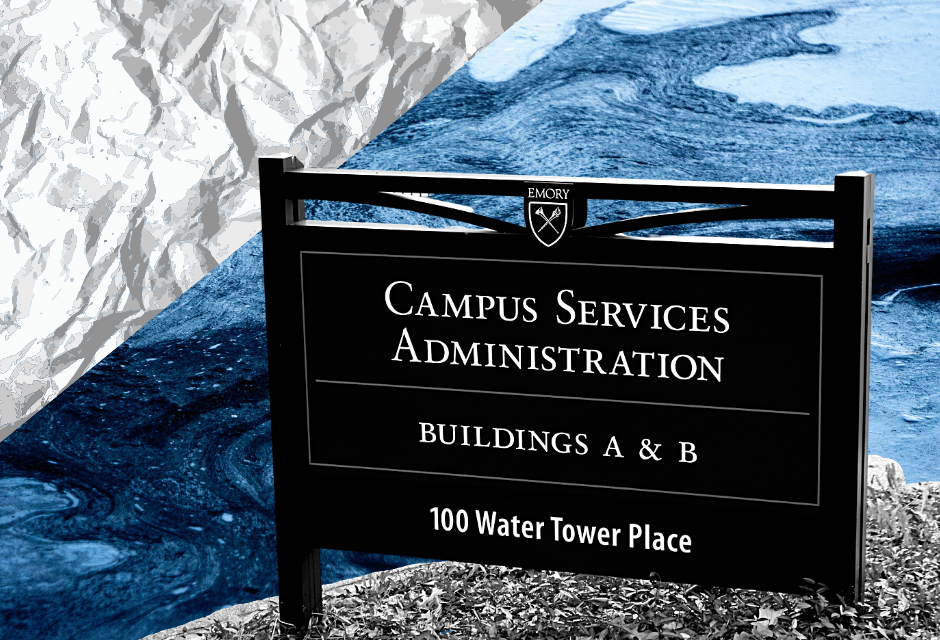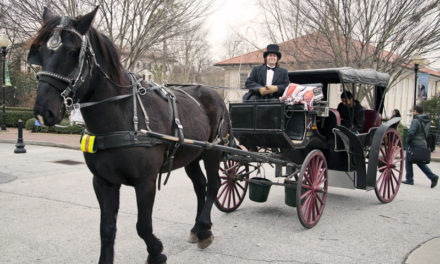Current and former employees of Emory Campus Services, who oversee building and campus upkeep, allege the department’s leadership fosters a toxic environment marked by rampant verbal abuse and exhaustion, as well as racist and misogynistic practices.
“I lived a miserable life,” said Miguel Duenas, a former Facilities Management supervisor who detailed the stress he faced on the job, which forced him to quit in 2014. “I wake up, I take my medicine — I’m doing okay now, but they really ruined my whole career.”
Campus Services operates under Emory’s Division of Business and Administration and oversees custodial services, facilities management, parking and transportation, fire and safety, energy utilities, and construction.
Over multiple interviews with the Wheel, 11 current and former employees likened Campus Services to a “good ol’ boys network,” in which they believe upper management freely excoriates and discriminates against lower-level managers, custodians, maintenance workers and parking enforcers.
These employees state that leadership chooses not to promote those from within the department who have extensive work experience. Instead, employees state that the leadership hires outsiders with little experience while ignoring their requests for additional training.
Current female employees also described a sexist climate in which they are overlooked for promotions and their ideas are belittled compared to their male counterparts. Other employees recounted times when managers in Campus Services made racist remarks toward them.
One female manager in Building and Residential Services recalled an incident when she disagreed with her male boss about how to correctly implement a new work schedule for employees. Rather than meet one-on-one, her boss called a department-wide meeting without consulting her and explained to everyone in attendance why her ideas were wrong.
“He made that whole entire meeting about me; I really felt uncomfortable,” the manager said. “I knew that he was specifically trying to tear me down.”
Campus Services encompasses 755 employees who are divided into a long chain of managers and workers, with the vice president and associate vice presidents composing the organization’s upper management. Departments within Campus Services are composed of senior directors, directors, mid-level managers, supervisors and front line employees. Current and former front line employees describe an environment festering with mistrust and favoritism within the hierarchy.
Ten current and former employees attributed institutional failures to the arrival of former Vice President of Campus Services Matthew Early’s in 2010, whose focus on employee performance pushed workers beyond their limits. Although Early left the University in September 2019, working conditions are still marked by mistrust and hostility, current employees said. Since the start of the COVID-19 pandemic, employees said they have been working double shifts without overtime pay .
Early, who is now the vice president of facilities management at King Abdullah University of Science and Technology in Saudi Arabia, did not respond to multiple calls and messages requesting an interview.
The current vice president of Campus Services, Robin Morey, who took over the position in March, largely denied allegations of a toxic workplace. He stated that the Campus Services Human Resources Department (HR) has not received a significant number of complaints and that the department has always been capable of addressing employee problems.
“People aren’t raising concerns to me,” Morey said. “But also understand that I am the vice president and when I walk in the room, employees might not feel comfortable discussing it in that way. I’m certainly trying to engender that trust in people.”
A Hyperfocus on Productivity
In 2014, Emory’s then-Executive Vice President for Business and Administration Michael Mandl sent an email to all Campus Services employees lauding the University as an “incredible institution” with a “powerful mission.”
“The performance of an organization is largely dependent on the performance of its workforce; average performance will not get us where we need to be,” Mandl wrote. “Employee performance should receive closer scrutiny, with an eye to moving lower performing employees out of the organization.”
That goal of a performance-driven organization led to a workplace that engendered bullying and favoritism, employees said.
After Early took over the top Campus Services position in July 2010, coming from his position as vice president of facilities operations at Columbia University (N.Y.), current and former employees say the department’s culture shifted dramatically. Early’s excessive focus on increasing revenues created an environment that forced workers to meet unreasonable expectations, employees said.
Myron Johnson, a former parking enforcer, said in an interview with the Wheel that Transportation and Parking Services compelled enforcers to give out tickets in a predatory manner, asking them to follow students and track their cars with security camera footage. Superiors demeaned enforcers who did not meet strict ticket quotas and gave them poor performance evaluations, he said.
“They wanted us to follow you and wait until you go inside of a building and then write you a ticket instead of being professional and saying, ‘Hey, you can’t park there. Let me show you a better place to park,’” Johnson said. “That’s what I was doing, and they didn’t like that.”
Managers used performance evaluations as a way to increase productivity, but employees say these are forms of micromanagement that cause undue stress and result in lower-quality work.
“They want robots,” a current Building and Residential Services employee, who asked to remain anonymous out of fear of retaliation, said of the department’s leaders. “They want ‘yes’ people, and if you don’t agree with them, they make you feel it. They target you; they withhold information that you need to successfully do your job.”
Morey disagreed with the characterization that expectations are unreasonable. He stated that 43% of employees met expectations and 50% exceeded expectations, according to a department review of performance evaluations over the past year. Fewer than 1% of employees were categorized as “needing improvement.”
The Wheel obtained physical copies of responses to an employee survey sent to Facilities Management workers in 2011. The employees were allowed to respond to the survey questions anonymously. Many of the employees complained of a disparaging work environment with low morale.
Johnson said his manager castigated employees daily, targeting those who complained about unfair performance reviews. His manager claimed he could “do or say whatever he wanted” around his subordinates because he was friends with Campus Services leadership, Johnson said.
Campus Services fired Johnson in July 2018 for a bad performance evaluation, six days after he issued a parking ticket to Early’s car unknowingly, parking permit records and email correspondence show. Johnson believes his termination was connected to writing the ticket.
Though he complained to Campus Services HR, Johnson believes his case was not thoroughly investigated.
Allegations of Racism, Misogyny
Steven Sanders, a former recycling specialist and custodial worker, recounted numerous instances of racist comments from Campus Services leadership toward workers. Sanders, a Black man, said he left the University in 2018 because he felt targeted when he spoke out about the overly taxing work.
At one meeting between management and custodial workers in 2017, Early told workers that Campus Services employees should not be publicly seen on Emory’s campus. He instructed these employees to take their lunch breaks in the “back of the house,” according to Sanders and two current employees, all of whom are of color.
“He wanted us to be out of sight,” Sanders said of Early. “The guy was just really racist.”
According to Morey, 63% of all Campus Services employees are Black. Early later apologized to the workers after Sanders and others complained to the University’s central HR department, Sanders said.
Morey confirmed the incident and Early’s apology, stating the department “has work to do to fix that history.”
Former Associate Vice President of Facilities Management Todd Kerzie, who no longer works at the University, would name-call and level racist nicknames toward workers, according to Sanders and two current employees. He labeled Black female employees “girls,” Sanders said.
At one meeting where employees requested a pay raise, Kerzie said they did not deserve a raise and should apply to work at Walmart if they did not like their jobs, according to Sanders and a written complaint from multiple current employees.
“We asked him about a raise, and he said, ‘Y’all don’t deserve a raise. I can go get my son if y’all don’t like your job, and if you don’t like it here, you can go to Walmart,’” Sanders said. “[Kerzie] would yell at you; he was really belligerent.”
Kerzie, who is now a director of Facilities Management at the University of Georgia, denied the accusations. While he confirmed his statements about the incident, he maintained that his tone was not demeaning.
“I’ve always said that we all have a choice where we’re employed. I don’t set the salary base that we have,” Kerzie said. “And if you didn’t want to work at Emory there are other places you can work.”
A current employee who was on the search committee that reviewed Kerzie’s application in 2013 said that, although he was unqualified for the job and the committee did not recommend hiring him, Early still offered Kerzie the position. The employee believes that Kerzie was offered the position because he and Early previously served in the military together.
Kerzie confirmed that he and Early had a prior relationship from their time in the military but maintained that it did not influence his hiring.
Sanders, who started at Emory in 2010, said he has never been considered for any management positions that opened. Half of the employees who responded to the 2011 anonymous survey echoed his complaint.
Three women in Campus Services said that doing their jobs means enduring discrimination and contempt from senior directors and leadership. These employees, who work in Building and Residential Services, requested to remain anonymous for fear of retaliation.
The first female employee said her male colleagues were not reprimanded in the same manner she was, despite feeling as though she performed at the same level. At a meeting where she and other male peers gave presentations to Campus Services leadership, the employee said she was singled out in front of the attendees and was criticized for her work performance while her male peers were praised.
She received little job-specific training when she was hired and was belittled when she sought help. Despite her efforts to improve, she said she still faced harsh scrutiny.
The second female employee noted that women in “blue-collar” departments, such as Facilities Management, were rarely promoted to director positions compared to women in “white-collar” departments, such as Information Technology and Sustainability Initiatives.
“There’s no trust within the department,” the first female employee said. “I don’t trust my leadership or my peers.”
Women make up 42% of Campus Services, Morey said. He attributed the lack of promotions for women in Facilities Management to the limited number of women in the industry as a whole.
“I think it’s fair to say that there are some trades where women are not as prevalent in the workforce, meaning plumbers, electricians,” Morey said. “We are underrepresented in that area, and that’s something that we have to work with our HR teams to get more diversity.”
Morey did not specifically address the three employees’ accusations of misogynistic practices.
Mental Stress and Harassment
Duenas, the former Facilities Management supervisor, has spent most of his career working in facilities maintenance and custodial positions on college campuses. Starting his career as a custodian at Stanford University (Calif.) in 1967, he moved to work at Columbia University (N.Y.) in 1995 in a supervisor role and came to Emory in 2005.
When Duenas believed he was the subject of targeted harassment and discrimination by managers in 2014, he filed a complaint with the University’s Office of Equity and Inclusion. His complaint alleged that Campus Services directors made racist comments toward him, such as mocking his accent and calling him a “donkey.”
In response, Duenas said managers took away his service truck and University-owned computer, changed the locks on his office door and withheld his uniform indicating his supervisor position.
“It felt suddenly that I’m not valuable anymore, no matter how much I try,” Duenas later told a University psychologist, according to medical records he provided to the Wheel. “It’s just a way to get me out of the system.”
Like other employees, Duenas believes the Office of Equity and Inclusion did not adequately investigate his complaint. He was prepared to sue the University but decided not to because his son was an Emory student on a scholarship at the time.
Duenas said the stress and harassment he endured contributed to his deteriorating mental and physical health. In the summer of 2014, Duenas suffered a heart attack during a meeting with managers, as they scolded him for failing to meet performance standards, according to medical records he provided the Wheel.
Duenas received benefits under the Family Medical Leave Act after the incident, and a psychologist at Emory’s Faculty Staff Assistance Program determined he was facing significant “physical, emotional, and cognitive decline in his daily adaptive functioning,” according to medical records Duenas provided the Wheel.
Another current custodial employee said her manager would “mentally torture” her subordinates by asking them to complete unreasonable tasks. The manager once asked her to set up heavy items that she could not lift on her own. Despite explaining that a different, better-equipped department should do that task, her manager docked her performance for failing to complete the task and verbally reprimanded her.
Although the employee and her peers complained about this manager to Campus Services HR, they did not address the issue.
Other employees confirmed they battled anxiety and depression because of their work environment. Johnson, like Duenas, took a medical leave to deal with work-related stress. Another employee sought out two psychologists.
Working Conditions Deteriorate Post-Pandemic
Despite Early’s departure from the University in September 2019, current employees believe the hostile atmosphere remains. Eight current employees say they distrust Campus Services leadership and feel unheard when they speak out about their problems.
One maintenance mechanic noted that since the start of the pandemic, Campus Services has been forcing employees to work double shifts: a daytime shift and a night shift from midnight to 8 a.m. The employee said he has suffered from severe sleep deprivation and acute stress as a result.
Email correspondence between supervisors and employees reveal that employees were initially asked to volunteer for double shifts. When no one did, a supervisor assigned individuals, and they weren’t paid overtime for their work, according to the emails.
“I work the daytime shift, and then I had to go home and come back again at 12 a.m., and then the next morning I felt like crap,” the employee said. “I didn’t sleep for over 24 hours, and I found that it was really unsafe … but I’ve been forced to work at night against my will.”
Despite complaining to his immediate superior and HR about the problem, nothing changed. Morey stated that Campus Services has not asked employees to work additional hours since the pandemic’s start, which contradicts the employees’ emails.
Another custodial employee said she felt unsafe working on campus because, unlike students, Emory employees aren’t required to receive COVID-19 tests. Although University policy states that staff must monitor their symptoms and wash their hands, the employee felt this was insufficient.
“How do I know that I’m safe if this employee hasn’t been tested?” the custodial employee said. “That’s really scary for me and my household, my son, to know that it’s not mandated.”
Since Aug. 22, 48 Emory staff members across all departments have tested positive for coronavirus.
As Campus Services leadership resort to hiring temporary workers with minimal experience and training, full-time employees said they’ve had to take on extra work or face scrutiny for poor work they didn’t do.
After taking a medical leave, Duenas decided not to return to the University. He now works at the University Inn at Emory, where he says his health has improved.
“Some employees used to come and cry on my shoulder when I was a supervisor over there,” Duenas recounted. “You couldn’t say anything … It was terrible.”
Former Editor-in-Chief | Isaiah Poritz (he/him) (21C) is from Salt Lake City, Utah, and majored in political science.





